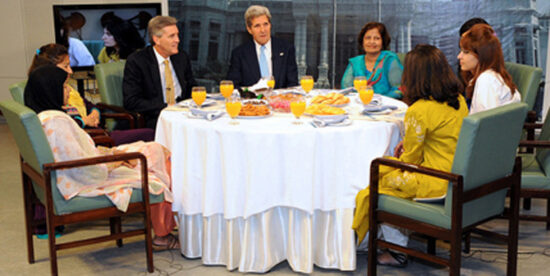
Ramadan is around the corner: What does that mean for International Visitor Leadership Program participants? Here are some tips from the U.S. Department of State.
ARE THE PARTICIPANTS FASTING?
Ramadan 2015 runs from about June 18 to July 16. If participants are fasting, they won’t eat or drink, including water, until sunset. During long, hot days, this will be challenging and a little accommodation and preplanning will be helpful. Check with the national program agency to find out if the participants plan to fast while they’re here. Islam makes fasting exceptions for people and some simply choose not to, but don’t assume your visitors will be participating in the fast. In addition, some may change their mind.
BREAKFAST BEFORE DAWN
Many fasters will get up before dawn to eat breakfast—this pre-dawn meal is called suhur. While traveling this can be tricky because most hotel kitchens aren’t open this early. Homestays during Ramadan would be ideal if hosts are able to accommodate the meal schedule. Try to schedule groups at hotels near restaurants that are open early in the morning or have refrigerators in the hotel rooms. If the hotel has a refrigerator, plan time to allow participants the chance to purchase food to keep in their rooms. Hotels are often willing to prepare a plate of hard-boiled eggs, yogurt, cheese, fruit and bread the night before and either deliver it to the room or give participants access to the kitchen. Please try to work with the hotel prior to arrival to arrange suhur details.
SKIP WORKING MEALS
Since some participants may not be eating or drinking during the day, it could be awkward to have them with others who are eating during a programmatic meeting. It is best to avoid any working meals, though appointments at lunchtime without food are fine. You should also inform your resources in advance that any fasting participants will not be drinking any water, coffee, or other beverages during meetings.
PROVIDE A PRAYER CHART
Some Muslims will want to do their five daily prayers. Prayer times follow a solar cycle, so they vary from place to place. It would be considerate of you to provide a prayer chart for your locale in the welcome packet, which can be obtained from a local mosque.
END THE WORKING DAY BEFORE SUNSET
Evenings during Ramadan are a time of celebration and worship. One minute after sunset fasters will drink water and eat something (this breaking of the fast is called Iftar), and often offer prayers. It’s important to make sure professional activities have concluded long enough before sunset to allow the participants to partake in the end of the fasting day rituals.
HOME HOSPITALITY
In Muslim countries, friends and family gather at homes before sunset, have Iftar one minute after sunset, say their prayers together, and then enjoy a leisurely meal. Home Hospitality during Ramadan would be very welcome. Our own warm hospitality is truly demonstrated when US communities offer family-hosted dinners during Ramadan. If fasting participants are invited to Home Hospitality please make sure hosts know when the meal should begin to allow the hosts to offer Iftar. Like Christmas and Thanksgiving, each family and country has traditional Iftar foods. You or the host may want to research the Iftar customs of the participant’s home country to make it extra welcoming.
EVENINGS AT THE MOSQUE
Each night during Ramadan many Mosques are open for late-night, Taraweeh prayers. Find out if your local mosques offer these prayers and share the information with participants.
EID: THE END OF RAMADAN
Ramadan will probably end July 16. Like the beginning, the exact date won’t be determined until the new moon is sighted. When it is, Muslims begin a three-day celebration of Eid. On the first day of Eid, Muslims will gather at the mosque for a congregational prayer and spend the day visiting with friends and family. Participants will most likely want to attend Eid prayer in the morning and have a light programming day, if any programming at all. This is a time to celebrate, so an expression of “Eid Mubarak” would be appreciated by all.
